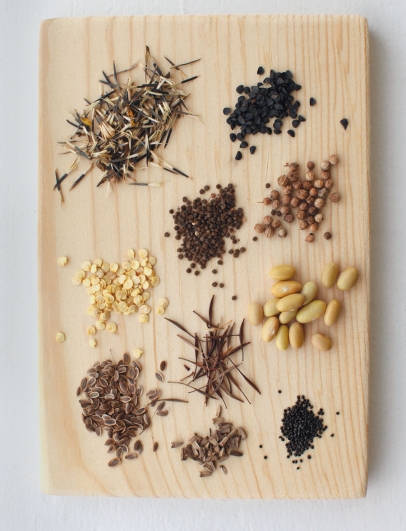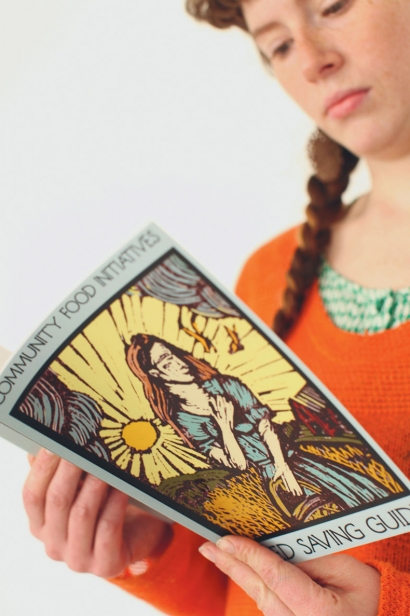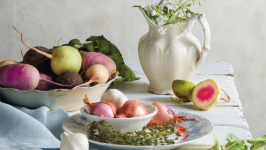Seed Sovereignty: Preserving Ohio's Seed Heritage
A regional seed company takes root in Athens to preserve southern Ohio’s seed heritage
“We talk about food all the time,” says Mary Nally, executive director of Community Food Initiatives (CFI) in Athens, Ohio. “But we never talk [about] its actual, true origin—its seed.” At least, she says, we aren’t talking about it enough.
Why Save Seeds
Loss of species biodiversity commonly conjures images of the destruction of tropical forests. However, agricultural diversity—our food supply—has seen a tremendous decline in the past century as well. Research from 1983 shows a loss of more than 90% of crop varieties grown in the United States in just 80 years. Shifts toward specialization, hybridization and genetic modification have each contributed to an overall standardization of our food economy. The result is a slow extinction of open-pollinated and heirloom plant varieties, and a decrease in the genetic diversity of our crops. Yet it’s diversity that creates resiliency both in ecosystems and in food systems, which is why saving heirloom and open-pollinated seeds has become a high priority task for CFI.
For more than 20 years CFI has worked to enhance the local food network of Southeast Ohio. Its mission is “to support a local food movement that expands fair access and nutritious foods for all people in our region.” While focused on overall food sovereignty, CFI also has a history of working on seed sovereignty—the right of an individual to save and use open-pollinated varieties of seeds.
Over the years the organization has developed and maintained a network of local seed savers from Athens and surrounding counties. A seed inventory listing the region’s open-pollinated varieties is published annually with information on how to contact growers to obtain seeds. CFI also hosts annual Seed Exchange events in Athens, where seed savers and the general public can come together to sell, swap or buy seed varieties. Though these events have been a great resource for the community, Mary says the downside is that they only happen once or twice a year.
“Wouldn’t it be easier,” she remembers thinking, “If you could go to the local gardening store and find seed packets of locally saved, open-pollinated, heirloom variety seeds that have Appalachian stories and history built into them?”
The Southeast Ohio Seed Savers
By February 2015, you could do exactly that. Thanks to two dedicated and enthusiastic seed savers and to current seed company developer, Jessica Chadwell, a pilot program for CFI’s first venture into social enterprise was born: the development of a micro-regional seed company. Working within their existing network of seed savers, CFI collected, packaged and sold 21 varieties of locally saved, open-pollinated vegetables, herbs and flowers at retail locations in Athens last year. Seeds were packaged in simple white packets with the name of the seed variety in bold black letters and a black and white logo with the company’s original name: Southeast Ohio Seed Savers (SOSS).
Now in its second year, Mary says, the company is adapting its focus. Although originally conceived as a micro-regional enterprise encompassing Southeast Ohio, the success of the first year and the importance of the task at hand has broadened the group’s perspective. Moving forward the company plans to expand to include seed varieties grown throughout central Appalachia. A new name for the company to reflect this growth is also forthcoming, and will be a focus of marketing efforts in the months ahead.
“We see 2016 as pilot year number two,” says Mary, who emphasizes that fast growth is not a part of their business plan. Instead, amidst all the work that goes into running a community non-profit, they are growing the seed company one day at a time, relying on feedback from the larger community as they move ahead. Looking forward, the company’s more immediate goals include working with new growers, increasing the seed supply and developing a greenhouse system for saving the trickier biennial seed varieties.
Everything Starts with Seeds
For Kira Slepchenko, one of the enthusiastic seed savers who encouraged the development of the seed company, access to seeds that are adapted to the local climate and soils is necessary in order to have a robust and reliable food system. The process of naturalization, of growing and saving the same seed varieties year after year, allows crops to adapt to the region’s soil, weather conditions and to the pests and diseases established in the area. Naturalized, open-pollinated varieties thus require fewer pesticides, and the more varieties of naturalized seeds, the more diverse and resilient the overall system. “Having seeds is the base of food security,” Kira tells me. “Everything starts with seeds.”
In addition to strengthening and diversifying the region’s food supply, there are other motivations for saving and selling regional seed varieties. Increasing the economic incentives available within the local food economy is an important priority. Seed saving, explains Mary, can provide an opportunity for individuals throughout the region to diversify their income. Acknowledging seed savers as the experts, the company plans to function as a kind of cooperative network so that those saving seeds can determine what varieties to sell and what prices growers are paid for their harvest.
Preserving local seed varieties also is about preserving local heritage. Born and raised in Meigs County, Ohio, Mary says she, like many, has struggled at times to develop a positive sense of identity and place in a region stigmatized by chronic generational poverty and high food insecurity. Yet she also recognizes reasons to be positive.
“We have so many people in this area who have been growing food for generations and whose food ways and skills have not yet been lost,” she says. Through saving seeds, Mary hopes she can help individuals in central Appalachia hold onto those skills and traditions, and foster a sense of pride in the region’s heritage.
To learn more about Community Food Initiatives visit communityfoodinitiatives.org.
Understanding Seeds
Open-pollinated refers to seeds that are pollinated by natural means, such as wind, insects or sometimes hand-pollinating by the grower. Open-pollinated seeds, if not cross-pollinated, will produce plants that resemble the parents and seeds that are genetically stable. Seeds can be saved and replanted the following year, adapting to local growing conditions over time.
Cross-pollination refers to the sharing of pollen among different varieties of the same species, resulting in seeds that aren’t genetically pure. Cross-pollination can be avoided in open-pollinated varieties by planting one variety at a time, or ensuring enough physical distance exists between varieties to avoid crossing.
Hybrid seeds are the result of controlled breeding by human intervention, a crossing of two genetic lines chosen to produce an offspring with certain desired traits. The resulting plant is not genetically stable, and the seeds won’t reliably produce plants similar to the parents. Hybrid seeds need to be purchased each year to produce a similar crop.
Heirloom refers to open-pollinated seed varieties that are passed down generationally, often outside of the commercial plant trade (though heirloom varieties have recently grown in commercial popularity). Heirloom varieties are sometimes designated by age (at least 50 years) and commonly have local or familial histories and significance.
All heirloom varieties are open-pollinated, but not all open-pollinated seeds are heirloom varieties.
2016 Southeast Ohio Seed Saver Varieties
Greens
Bloomsdale Long Standing Spinach
Bok Choy
Jack Rugged Kale
Lettuce Mix
Vegetables
Yellow Globe Onions
Molted Acorn Squash
Butternut Squash
Lemon Drop Pepper
Bull Horn Pepper
Beans
Mayocoba Bean
Roma Pole Bean
Cowpeas
Flowers
Orange Cosmos
Zebrina Hollyhock
Pink Hollyhock
Cleome
Sunflower
Cockscomb
Calendula
French Marigold
Lemon Drop Marigold
Echinacea
Herbs
Garlic Chives
Chives
Dill
Cilantro
Sweet Italian Basil







